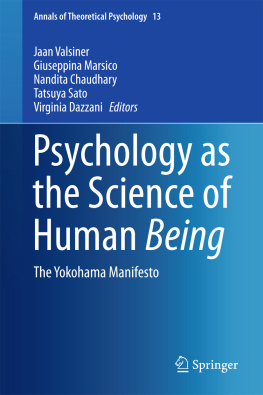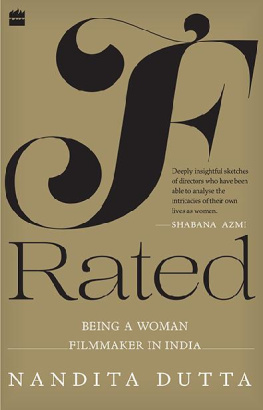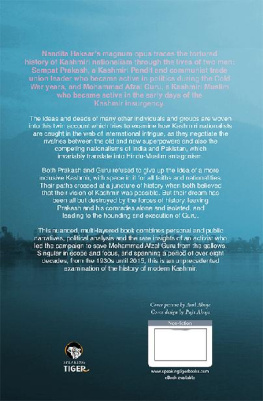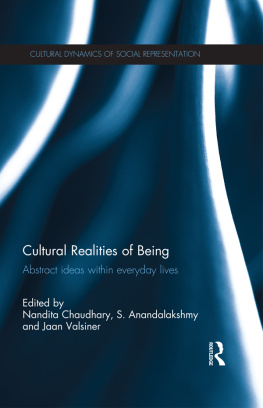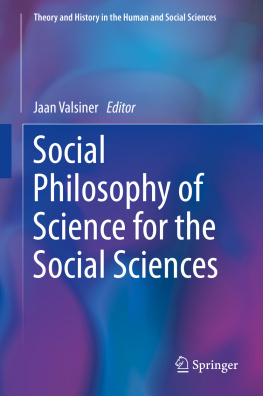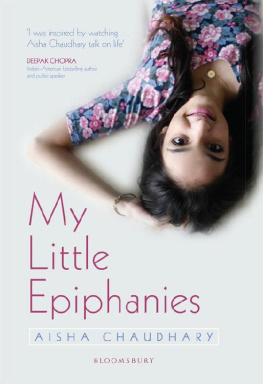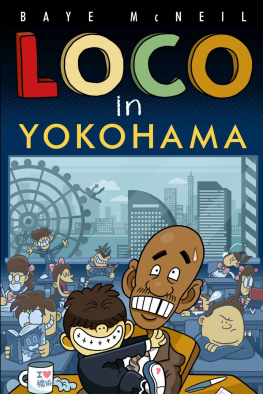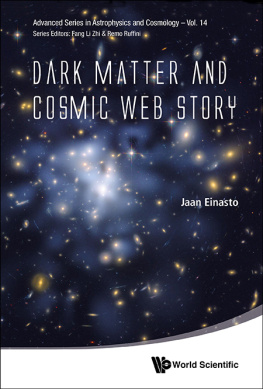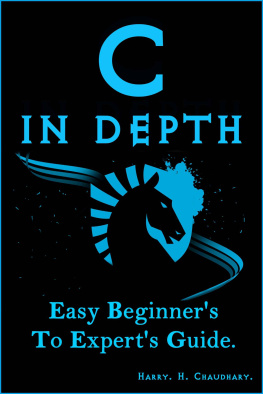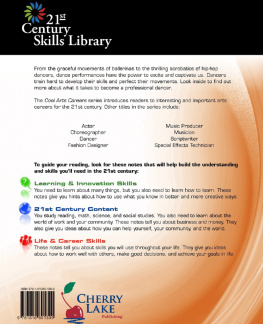Springer International Publishing Switzerland 2016
Jaan Valsiner , Giuseppina Marsico , Nandita Chaudhary , Tatsuya Sato and Virginia Dazzani (eds.) Psychology as the Science of Human Being Annals of Theoretical Psychology 10.1007/978-3-319-21094-0_1
1. Psychology as a Normative Science
In keeping with the manifesto spirit of this volume, I shall put all caution aside in this chapter and initially make two foundational claims about psychological phenomena before I move on to discuss three conclusions that I believe follow from the initial claims. By invoking the rather grand idea of psychological phenomena, I am simply referring to the processes that psychologists ( as psychologists) should rightly be studying. Chemists study molecular processes, biologists study life processes ( zoe to use the Greek term), and psychologists supposedly study mental life or mental processes, whatever this may signify. My claims are in short that such mental processes, at least in their developed human manifestations, should be seen as (1) doings that are (2) conversational . If so, psychology becomes a normative science, or so I shall argue.
Reasons and Causes, Actions and Behaviors
Needless to say, all claims can be challenged and discussed, and this obviously also goes for the two (rather sweeping) claims that I shall be making here, but I do believe that denying these propositions is equivalent to denying that there can be a psychological science in the first place. Paradoxically, much of contemporary psychology implicitly or explicitly denies these claims and thereby (if my argument is valid) renders its own scientific endeavors impossible. Most psychological research thus works with variables and is interested in measuring the causal effects of such variables upon human behavior. Agency, meaning, and intentionality disappear. So, as I hope to make clear, denying the two claims is tantamount to eliminating human agency, or, in other words, disregarding our capacities as human beings for being responsive to the reasons for acting, feeling, and thinking that are afforded by the situations and practices in which we find ourselves. Instead of beginning with these higher-order psychological phenomena, the standard account in psychology states that psychologylike all sciences worthy of the nameshould study causes and effects (rather than reasons and responsivity ) and conceive of human action as mere behavior .
Bios and Zoe
To borrow a distinction that goes back to Aristotle and was made famous by Arendt (), but here I shall attempt to express the idea in a less technical way. A space of reasons is one in which people operate as agents, based on judgments about what is a reason for what. Noticing the elderly lady with damaged grocery bags provides (under normal circumstances) a reason for others to help. The relationship between the situation and the preferred action (to intervene and help) is wholly unlike causal relationships between, say, the weight of the goods in her bags and the ensuing accident when the goods fall on the ground. The latter should rightly be seen within a space of causation. The goods have no reason to destroy the bags and fall on the ground. They simply do this because of blind causal powers involving gravity.
Psychological Phenomena Are Being Done by Persons
That psychological phenomena are done by persons is the first claim I shall be making. Establishing the link to Arendts distinction is easy: A persons life (in the biographical rather than biological sense) is something the person conducts . A life does not lead itself, but is an active process involving the person in collectives of others. We live our lives; it is an active process. Setting the case of severely psychotic persons aside as an extreme example, we do not normally have the experience that our lives simply happen to us, and we do not talk about our lives in this way. When we say to someone that she should Get a life! we do not mean that the person should become alive, e.g., begin to breathe again after a heart attack, but rather that she should initiate meaningful actions in relation to worthwhile life projects and values.
Interestingly, the original Greek meaning of psyche was much closer to the biological sense ( zoe ) than the psychological one ( bios ), as it referred to the fundamental life principle of all living things (plants, animals, humans). Psyche was an animating power related to breath, to being alive in a fundamental sense, and Aristotles On the Soul basically belongs to biology, whereas his psychology is primarily found in his Nicomachean Ethics that deals with life as praxis (Aristotle ). The latter work is concerned with much more than living organisms, because it addresses the whole normative realm (the human space of reasons, one might say) within which we live our lives, which is why such themes as friendship, moral action, and the virtues take center stage in Aristotles ethical psychologyor psychological ethics.
So the first claim is that psychological phenomena properly belong to the realm of bios rather than zoe . I hasten to say that my view does not imply a clearly delineated border between the two realms. Psychology is often most interesting when addressing phenomena that fall somewhere in the gray area between the things that people do and the things that simply happen to (or in) them. We can sometimes say that some psychological process is clearly donefor example when someone is trying to perform mathematical operations, which cannot meaningfully be said to happen to the person. But most of our emotional life belongs in the gray area: We might feel that our grief occurs to us after a loss, for example. We are overwhelmed by sadness and think of ourselves as victims or sufferers in such a situation. However, even an emotion such as grief is not simply a mechanical reaction that happens to occur like an effect following a cause.
Doing Grief and Patienthood
Grief is also done or performed by skilled human actors, who can only grieve properly if they know their local moral order (Harr ). This is not to say that grief is an action that can simply be stopped (like playing football with friends, which stops whenever the players become bored with the game or are leaving because of other appointments). But it is to say that grief is not a mechanical reaction , but rather a response to a loss, and the loss is not simply a cause that triggers an emotion, but a reason for feeling and expressing grief. This also explains why grief (like other emotions) may be evaluated morally: The person who does not grieve sufficiently is easily seen as shallow or aloof (whether justified or not), whereas the person who is experiencing extreme grief in a situation that does not call for deep mourning can be accused of overdoing it. Ester Holte Kofod has recently studied parents grief after the loss of an infant and found that they do not only struggle with the loss as such, but also struggle with navigating the rather unclear normativity in this tragic situation: On the one hand, there is a cultural discourse claiming that the worst thing a human being can experience is the loss of a child, but, on the other, there is also a discourse implying (to put it bluntly) that the loss is supposed to be less intense when the child is so small at the time of its death (Kofods participants have lost their children either before, during, or soon after giving birth) compared to older children that the parents have gotten to know (there is also a cultural discourse, which implies that the loss of very old persons should call for less intense forms of grief). Howand how muchshould one grieve then? This is not an easy question, but one that Kofods participants reflect upon, lending support to the idea that also difficult emotions that overwhelm us have a normative aspect.

